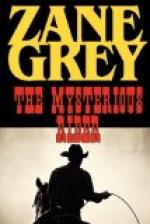“Strange how it seems good to live—when I look at a columbine—or watch a beaver at his work—or listen to the bugle of an elk!” mused Bent Wade. He wondered why, with all his life behind him, he could still find comfort in these things.
Then he rode on his way. The grassy valley, with its winding stream, slowly descended and widened, and left foothill and mountain far behind. Far across a wide plain rose another range, black and bold against the blue. In the afternoon Wade reached Elgeria, a small hamlet, but important by reason of its being on the main stage line, and because here miners and cattlemen bought supplies. It had one street, so wide it appeared to be a square, on which faced a line of bold board houses with high, flat fronts. Wade rode to the inn where the stagecoaches made headquarters. It suited him to feed and rest his horses there, and partake of a meal himself, before resuming his journey.
The proprietor was a stout, pleasant-faced little woman, loquacious and amiable, glad to see a stranger for his own sake rather than from considerations of possible profit. Though Wade had never before visited Elgeria, he soon knew all about the town, and the miners up in the hills, and the only happenings of moment—the arrival and departure of stages.
“Prosperous place,” remarked Wade. “I saw that. An’ it ought to be growin’.”
“Not so prosperous fer me as it uster be,” replied the lady. “We did well when my husband was alive, before our competitor come to town. He runs a hotel where miners can drink an’ gamble. I don’t.... But I reckon I’ve no cause to complain. I live.”
“Who runs the other hotel?”
“Man named Smith. Reckon thet’s not his real name. I’ve had people here who—but it ain’t no matter.”
“Men change their names,” replied Wade.
“Stranger, air you packin’ through or goin’ to stay?”
“On my way to White Slides Ranch, where I’m goin’ to work for Belllounds. Do you know him?”
“Know Belllounds? Me? Wal, he’s the best friend I ever had when I was at Kremmlin’. I lived there several years. My husband had stock there. In fact, Bill started us in the cattle business. But we got out of there an’ come here, where Bob died, an’ I’ve been stuck ever since.”
“Everybody has a good word for Belllounds,” observed Wade.
“You’ll never hear a bad one,” replied the woman, with cheerful warmth. “Bill never had but one fault, an’ people loved him fer thet.”
“What was it?”
“He’s got a wild boy thet he thinks the sun rises an’ sets in. Buster Jack, they call him. He used to come here often. But Bill sent him away somewhere. The boy was spoiled. I saw his mother years ago—she’s dead this long time—an’ she was no wife fer Bill Belllounds. Jack took after her. An’ Bill was thet woman’s slave. When she died all his big heart went to the son, an’ thet accounts. Jack will never be any good.”




